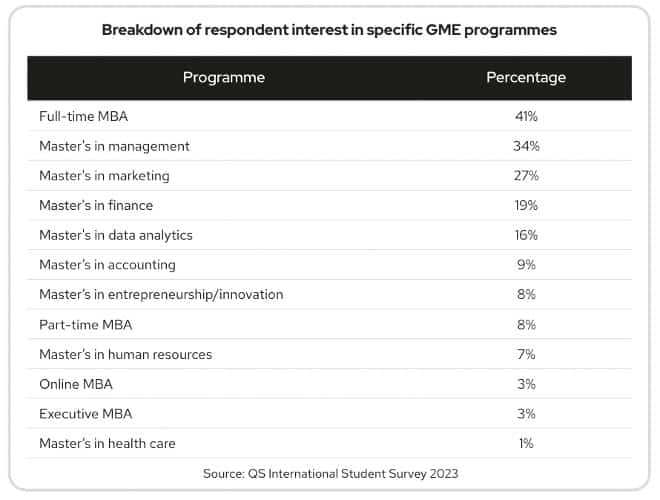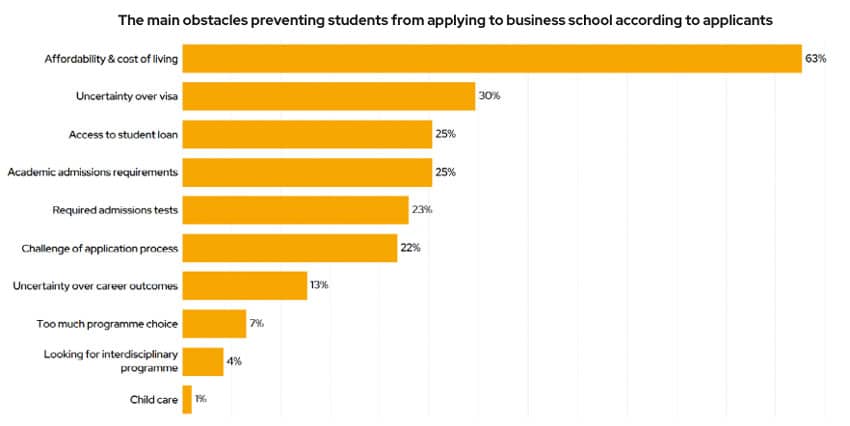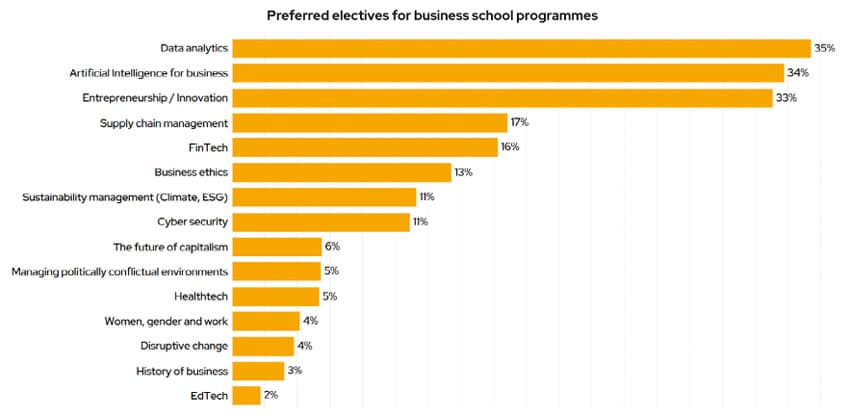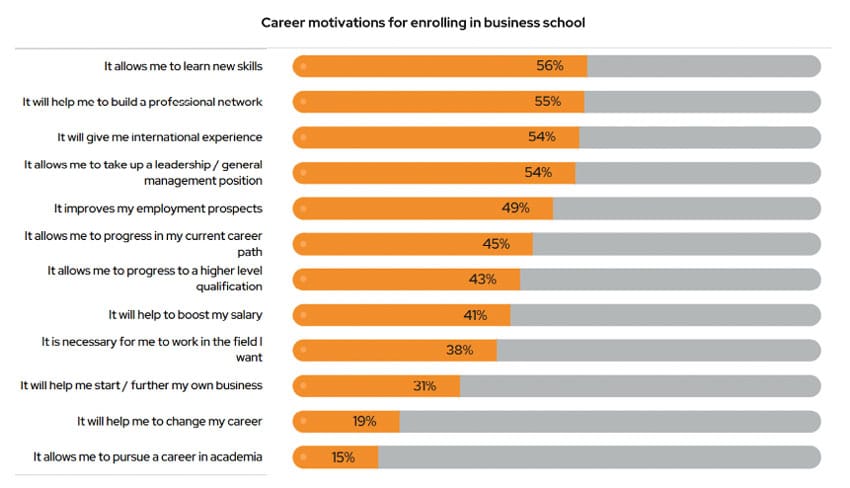How international students are deciding on graduate business schools
- A new QS report based on a three-year sample of more than 28,000 business school candidates reveals the increasing popularity of sustainability-oriented studies and careers, as well as AI and data analytics fields
- Students have significant concerns about costs of studying/living and whether they will be able to find quality, affordable housing
QS has conducted an extensive survey exploring the motivations and preferences of international students interested in advanced business studies (Graduate Management Education, or GME). More than 11,000 students representing 160 nationalities responded to the QS International Student Survey 2023, contributing to a total three-year survey sample of 28,000 responses. QS subsequently published the report entitled “Business school applicant trends and motivations in 2024.”
Most students were from Asia-Pacific (48%) or Middle East/Africa (44%), with the remainder in Europe, Latin America, and North America. The largest proportion had 1-3 years of work experience (32%), while 19% had 4-6 years of work experience. Another 23% had no work experience when applying to a graduate business school programme.
Destination and study preferences
The top preference of respondents was to study in the UK (29%), followed by the US (16%), Canada (14%), and Australia (12%). In terms of competitive advantage, Canada’s brand is tied to its post-study work permit (PGWP) and the UK remains renowned for quality of education. Canada and Australia are seen as more affordable than the UK and US.
As in previous years, the largest share of prospective students were interested in MBA studies, but other specialisations also claimed a significant amount of interest, as shown in the following chart.

Key trends
When analysing the vast amount of data collected by the survey (and previous surveys), QS pulled out several trends that are relevant to all GME business schools recruiting international students, wherever they are in the world. These include:
Openness to blended learning: On-campus learning is the preference of most applicants, but interest in a mix of in-person and online learning (blended/hybrid learning) rose to more than a quarter of applicants (8.5% “very interested” and an 18.6% “more interested than disinterested) in 2023. At the same time, demand for online delivery and MOOCs has declined significantly since 2021. Only 4.4% of applicants were seriously considering online-only study last year, compared to 18.2% in 2021. Similarly, only 5.3% were very interested in MOOCs in 2023 compared to 19.6% in 2021.
Interest in interdisciplinary programmes: Demand is spiking for business programmes that include a focus in other fields, reflecting the niche and increasingly specialised needs of global employers.
Sustainability matters: Finance remains the top choice for study focus, but business programmes with a sustainability orientation are growing in popularity. An institution’s commitment to sustainable values (including the UN’s Sustainable Development Goals, or SDGs) is now a top three factor affecting students’ choice of institution. Applicants are increasingly considering careers “in organisations with a clearer societal impact” and the UN and UNICEF join Amazon, Google, and Apple in top 20 graduate career choices.
Working while studying: GME applicants – like international students in general – want to work while studying, preferably in areas related to their academic focus.
Worries about feeling unwelcome: In 2021, 25% of respondents said they were anxious about being made to feel unwelcome in a host country. This rose to 31% in 2023.
Concerns about costs of studying/living: QS notes, “High costs and limited scholarships are major deterrents for prospective students, highlighting the need for more financial support and accessible education options.” More than three-quarters (67%) of specialised master’s candidates said financial constraints were their main barrier, followed by 40% citing the need to have work experience to be eligible for admission. Financial constraints were also the main barrier for MBA candidates (73%), followed by economic/job market worries (59%).

Relatedly, more than half of respondents (51%) in 2023 said the availability of scholarships influences their choice of destination and institution, in line with findings from the previous two surveys.
Accommodation issues: Students are increasingly worried that they will not be able to secure quality, affordable housing. More than half (51%) said the challenge of finding accommodation was a real issue in 2023, compared with 45% in 2021. QS says this suggests “the need for business schools to increase the financial and practical support they provide.”
The rise of AI and data analytics: These specialisations emerged as the top electives for prospective students, followed closely by entrepreneurial studies. Relatedly, applicants are now prioritising skills acquisition just ahead of networking and leadership development when thinking about how a business school will prepare them for their career goals.


Recommendations
QS makes several recommendations based on the survey data, including:
- “Align your programmes to meet Generation Z’s preferences for practical skills and the ability to work while studying. Offer courses that directly translate to real-world applications and job market needs.
- Integrate sustainability and social responsibility into the core curriculum. Prepare students to tackle environmental challenges and ethical business practices.
- Electives: Introduce and expand elective courses in AI and data analytics. Ensure students are equipped with cutting-edge technological skills and knowledge that are increasingly demanded in the business world.
- Broaden career services to support diverse aspirations, including roles in tech, non-profits, and global organisations. Help students align their career paths with their personal values and societal impact goals.
- Develop more scholarship programmes and financial aid options to make business education more accessible.
- Actively work on creating a diverse and inclusive environment within the school. This involves enrolling a diverse student body and also addressing these themes in the curriculum and school culture.”
For additional background please see:
- “Sustainability factors in the study abroad research for nearly half of international students”
- “The impact of immigration settings, affordability, and job opportunities on international students’ study abroad decisions”
- “Business school survey again signals declining non-EU enrolment in the UK”
- “UK’s business schools highly reliant on international postgraduate students”















